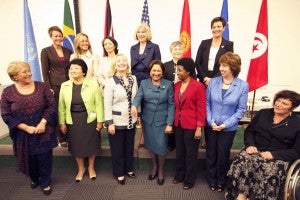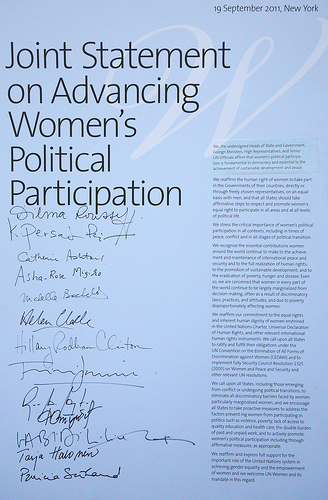World Leaders Draw Attention to Central Role of Women’s Political Participation in Democracy
Date:
UN WOMEN PRESS RELEASE
For immediate release

United Nations, New York — Women make up less than 10 percent of world leaders. Globally less than one in five members of parliament is a woman. The 30 percent critical mass mark for women's representation in parliament has been reached or exceeded in only 28 countries. At a high-level event today, during the 66th session of the UN General Assembly in New York, women political leaders made a strong call for increasing women's political participation and decision-making across the world. Stressing that women's participation is fundamental to democracy and essential to the achievement of sustainable development and peace in all contexts — during peace, through conflict and post-conflict, and during political transitions — the leaders signed on to a joint statement with concrete recommendations on ways to advance women's political participation.
“It is a solidarity that we see represented here today among this important group of women around me, said Michelle Bachelet, Under-Secretary-General and Executive Director of UN Women, at the event. “We are bound by a common goal — to open the way for women to participate in all decisions affecting not only their own lives, but the development of our world, at the global, regional, national and local levels. By making full use of half the world's intelligence — the intelligence of women — we improve our chances of finding real and lasting solutions to the challenges that confront us.
Signatories of the joint statement include (as of 10 October):
H.E. Dilma Rousseff, President of Brazil; Honourable Kamla Persad-Bissessar, Prime Minister of the Republic of Trinidad and Tobago; H.E. Hillary Rodham Clinton, Secretary of State of the United States of America; Rt. Hon. Baroness Catherine Ashton, High Representative of the European Union for Foreign Affairs and Security Policy and Vice-President of the European Commission; H.E. Roza Otunbayeva, President of the Kyrgyz Republic; H.E. Tarja Halonen, President of Finland; Ms. Trinidad Jiménez, Minister of Foreign Affairs of Spain; Rocio Garcia Gaytan, Minister of Women's Affairs, Mexico; Dr. Aurelia Frick, Minister of Foreign Affairs of the Principality of Liechtenstein; Lilia Labidi, Minister of Women's Affairs, Republic of Tunisia; Leire Pajín, Minister of Health, Equality and Social Policy, Spain; Rt Hon Theresa May, Home Secretary and Minister for Women and Equalities, United Kingdom; Patricia Janet, Baroness Scotland of Asthal, UK; Dr. Asha-Rose Migiro, UN Deputy Secretary-General ; Helen Clark, Under-Secretary-General and Administrator, UN Development Programme; and Michelle Bachelet, Under-Secretary-General and Executive Director, UN Entity for Gender Equality and the Empowerment of Women.
Details of the event, including webcast archive: http://j.mp/WomLeaders
Photos: http://flic.kr/s/aHsjw6ryVk
Joint Statement
On Advancing Women's Political Participation
New York, 19 September 2011
We, the undersigned Heads of State and Government, Foreign Ministers, High Representatives, and senior UN officials affirm that women's political participation is fundamental to democracy and essential to the achievement of sustainable development and peace.
We reaffirm the human right of women to take part in the Governments of their countries, directly or through freely chosen representatives, on an equal basis with men, and that all States should take affirmative steps to respect and promote women's equal right to participate in all areas and at all levels of political life.
We stress the critical importance of women's political participation in all contexts, including in times of peace, conflict and in all stages of political transition.

We recognize the essential contributions women around the world continue to make to the achievement and maintenance of international peace and security and to the full realization of human rights; to the promotion of sustainable development; and to the eradication of poverty, hunger and disease. Even so, we are concerned that women in every part of the world continue to be largely marginalized from decision-making, often as a result of discriminatory laws, practices, and attitudes, and due to poverty disproportionately affecting women.
We reaffirm our commitment to the equal rights and inherent human dignity of women enshrined in the United Nations Charter, Universal Declaration of Human Rights, and other relevant international human rights instruments. We call upon all States to ratify and fulfill their obligations under the UN Convention on the Elimination of All Forms of Discrimination against Women (CEDAW) and to implement fully Security Council resolution 1325 (2000) on women and peace and security and other relevant UN resolutions.
We call upon all States, including those emerging from conflict or undergoing political transitions, to eliminate all discriminatory barriers faced by women, particularly marginalized women, and we encourage all States to take proactive measures to address the factors preventing women from participating in politics, such as violence, poverty, lack of access to quality education and health care, the double burden of paid and unpaid work, and to actively promote women's political participation, including through affirmative measures, as appropriate.
We reaffirm and express full support for the important role of the United Nations system in achieving gender equality and the empowerment of women, and we welcome UN Women and its mandate in this regard.
Media Contacts:
- Jelena Vujic, Delegation of the EU to the UN, +1 212 401-0123, jelena.vujic[at]eeas.europa.eu
- Gustavo Sénéchal, Mission of Brazil, +1 212 372-2614, gsenechal[at]delbrasonu.org
- Melissa Boissiere, Mission of Trinidad and Tobago, +1 212 697-7620, mboissiere[at]trinbago.org
- Stanislav Saling, UNDP, + 1 212 906-5296, stanislav.saling[at]undp.org
- Oisika Chakrabarti, UN Women, +1 646 781-4522, oisika.chakrabarti[at]unwomen.org